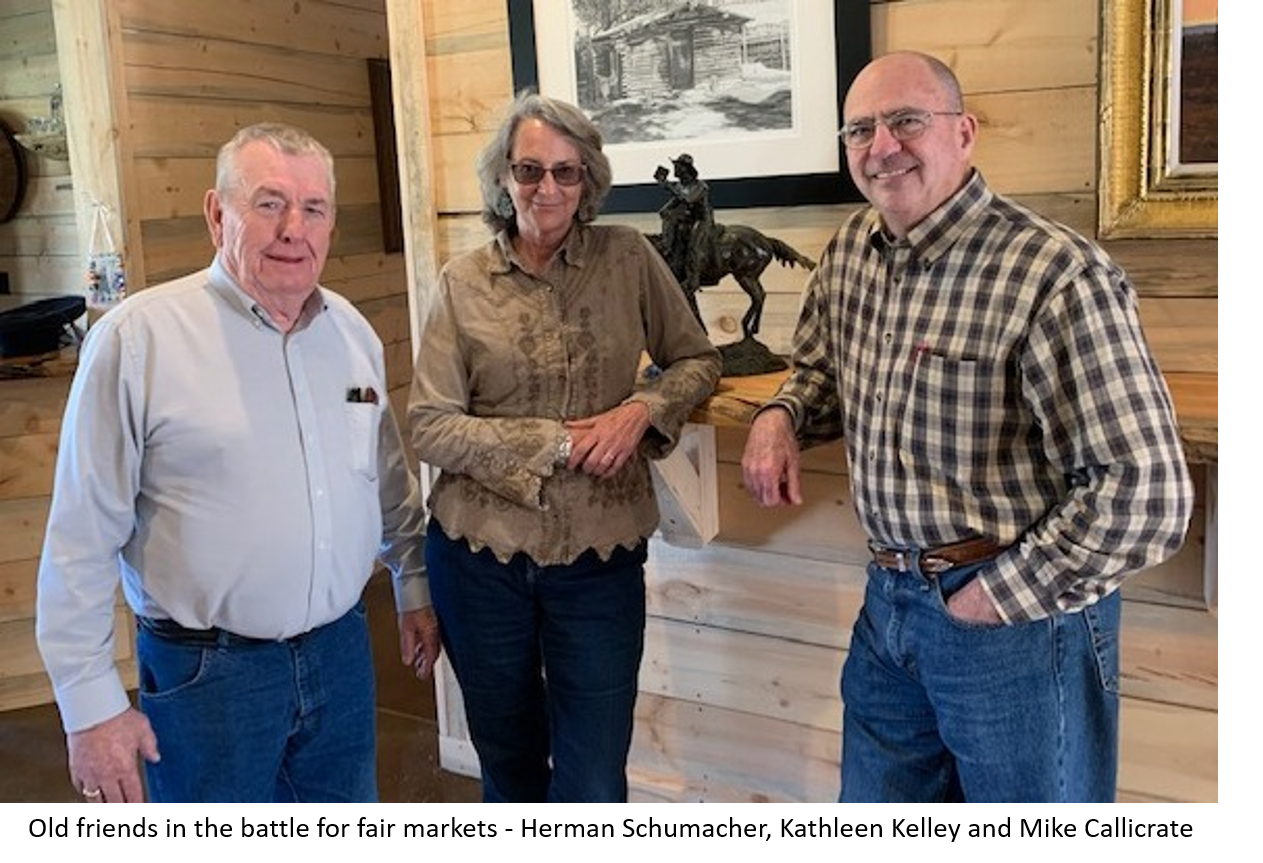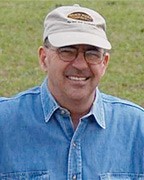And how do we return to a safe and resilient food system?

The year was 1981. It was the year we lost the cattle market.
Clark Willingham, an accountant and an attorney, not ever a cattleman but certainly a wine and dine consumer who liked the limelight, (Beef, 2001) filed a lawsuit to end the Packer Consent Decree of 1920. End it, he did. The win in that case for Hitch feeders was like a droplet of water hitting sulfuric acid destroying the market and the competition for cattle that kept the small town packing houses, the farmer/feeders, and the mom and pop grocery stores in business. The food supply for Americans was plentiful, top quality, and considered the safest in the world. Consumers knew their product. They knew Prime, Choice, and Select. They knew that aged beef was important to quality and flavor and when they asked a question of the grocery store butcher, the one who cut the carcass, they got an answer they could trust.
“The food supply for Americans was plentiful, top quality, and considered the safest in the world.”
What this litigation did to the consumer, and its domino effect, is illustrated by the numbers. According to a report by USDA Consolidation in the U.S. Meatpacking Industry, “Four-firm concentration in cattle slaughter remained stable from 1963 through 1977, then rose from 25 percent in 1977 to 71 percent in 1992 …The change in cattle slaughter concentration is unique: no other product class shows as dramatic an increase in any 15-year period” (USDA, 1996).
The decade of the 70’s just before the litigation was one of the best in American agriculture and the only time in history where the average return to the American farmer exceeded wages and salaries compared to other segments of the economy (PBS).
Willingham’s lawsuit is iconic of the end of that era. The end of competition. The end of fair markets. And the loss of dignity and dreams for small-town boys and girls and the farms and ranches surrounding them. And the end of a safe, secure, and affordable food supply. It denied the consumer from having a choice or any kind of say in the market. A lot of organizations gave lip service to “what the consumer wants” but ultimately, to the packers, what the consumer wanted was irrelevant and somewhat of an annoyance to their bottom line.
“This new era of agriculture was about efficiency and economies of scale.”
This new era of agriculture was about efficiency and economies of scale. It was about “Get big or get out!” Secretary of Agriculture, Earl Butz said so. (Butz) Efficiency and size took over, with no regard for quality, safety, or food security. By the late 1970s, IBP was the world’s largest meatpacker. It had done so by putting the smaller meatpacker out of business and eliminating the “inefficient” grocery store butcher by offering so-called efficient, boxed beef. Chain grocery stores jumped at the new boxed beef, allowing them to eliminate well-paid skilled butchers and offer a cheaper product. They too began to consolidate.
The Wall Street Journal, November 1975, ran a front-page story, noting that IBP was larger than all five of its nearest competitors put together, and denouncing the company as a magnet for “criminals, gangland figures, civil wrongdoers … and people engaged in vicious beatings, shootings, and firebombings.” (IBP, Inc) But who cared? Boxed beef was efficient and cheaper. (Vicious Circles)
“The death of the Packer Consent Decree was a bright flashing green light to plunder and pillage one of our nation’s most important industries.”
In 1981 Occidental Petroleum Corporation, an oil company owned by Angus breeder hobbyist, Armand Hammer, purchased IBP with the intent to expand the boxed beef market into the Soviet Union and to create a consolidated meatpacking operation there, based upon IBP’s growth model in the U.S (NY Times, 1981). The death of the Packer Consent Decree was a bright flashing green light to plunder and pillage one of our nation’s most important industries.
In 1998 IBP developed an amazing tool to depress prices paid for live cattle, their biggest input cost. It was called the “Formula,” a new form of captive supply. Mike Callicrate termed this new formula the “nuclear warhead of captive supplies.” Captive supplies were the inventories of cattle the meatpacker controlled, either through ownership, contract, or in some other way, without having to compete. Callicrate said, “IBP didn’t invest a single penny or build a single fence, they didn’t have to feed an animal or worry if an animal got sick or died, yet they could gain complete control of an inventory of cattle just by giving preference to a few large cattle feeders who were having difficulty selling their cattle in a market that was becoming less accessible by the day. If the big packers were robbing the bank, it was the big corporate cattle feeders who were driving the getaway car! It was brilliant! IBP got all the cattle they needed when they wanted them. The big packers were now fully managing the market rather than competing in it – and posting record profits.” IBP asserted its role as price leader and the other big packers were following. (IBP history)
“Today around half of our ranchers are out of business and over 80,000 cattle feeders are gone.”
As cattlemen, we lived the economic collapse caused by formula cattle. Today around half of our ranchers are out of business and over 80,000 cattle feeders are gone. The weakened cash seller became a tool of the packer to depress prices to all cattle producers, including the formula sellers that received preferential prices. We know the formula for its negative effect on prices overall, and its ability to control the flow of cattle into the packing houses, but we often don’t think about the impact on the entire food supply.
Here is what it did to the consumer: After IBP captured significant supplies, they weren’t totally out of the cash market–they were in it only long enough to drive prices in the direction they wanted. IBP became the price leader with the other big packers following. Their purchase volumes made it difficult for the smaller and regional packers to access important supplies of fat cattle, and their predatory pricing blocked smaller independents from selling to wholesale accounts. Feedyards also began to consolidate. Formula feedyards, receiving preferential pricing, had an unfair advantage over the smaller farmer feeder, who held on as long as he could by value-adding his own feed through his cattle. These smaller feeders saw their Rolodex shrink from twenty buyers down to two and maybe only one. Feedlots, instead of being smaller, environmentally conscious entities that provided valuable soil building manure fertilizer for grain and feed fields, became bigger, more concentrated, highly polluting entities serving the needs of the giant packing companies, and away from the more consumer and labor-friendly local and regional packing houses. (Duke, 2015) And pigs were moved off the land and into factories.
Independent grocers were also having trouble accessing beef carcasses, finding anything except boxed pork and factory produced chickens. They had no choice but to also turn to preprocessed proteins.
Understand this about market consolidation: It is why today, giant plants of 4,000 meat butchers and meat cutters standing shoulder to shoulder processing up to 400 head of cattle per hour, threaten our food safety and security. It is why chicken integrator, John Tyson, the now owner of a further consolidated beef packer, IBP, Inc., can arrogantly, blithely declare that the food chain is “broken” and call for help from the president to get the “chain moving again.” He should know it is broken. His company broke it and he is ready and happy to profit from the breaking. (Bloomberg News)
Getting the existing fragile food chain moving again will not fix it. It will only perpetuate the harm. If you are panicking right now because you can’t sell your cattle, if you’re panicking right now because the grocery store shelves are empty, the biggest mistake you could make is to endorse and support our existing supply chain. To do so will keep cattle prices low, meat prices high and main streets of America empty.
“Everyone along the supply chain is hurting except the big meatpackers.”
The efficiency era is summed up this way: The nation’s largest meatpacker has bottlenecked beef and other meat, forced men and women back to work through a presidential executive order, and is charging the highest box beef prices ever to consumers, who cannot afford it, while at the same time–paying depression level prices for cattle. Everyone along the supply chain is hurting except the big meatpackers.
And nobody is stopping them.
Why should men and women risk their lives to grind $8 a pound hamburger that only a handful of consumers can afford to buy? Why should cattle producers be paid far less than their costs for the quality cattle they produce? And why should the American consumer, stressed and out of work pay $8 for a pound of hamburger?
This is going to be a white-knuckle ride.
Let’s make some points clear: Efficiency, as a mantra of business development, must be recognized for its clear, dangerous failure. COVID-19 is not to blame. (NY Times)
The model of efficiency did this:
1. Destroyed small businesses like independent grocery stores and destroyed family farming and ranching as evidenced by our boarded-up storefronts in rural America;
2. Destroyed food safety as evidenced by meat recalls and CDC food contamination reports;
3. Destroyed food security as evidenced by recent empty grocery store shelves and obscene meat prices;
4. Destroyed jobs, lots of them, as evidenced by the current unemployment rate yet to be fully disclosed;
5. Destroyed access to information about the food system, as evidenced by limited labeling on food;
6. Destroyed the consumer connection to the producer by providing false and misleading information on the products they buy;
7. Destroyed our independence by making too many believe that efficiency was security–the greatest lie of all. This economic efficiency has drained the wealth of our nation into the pockets of a few.
1996 was a year we tried to hit the reset button and tried to reverse the destructive efficiency model and get back to fair and competitive markets. Herman Schumacher was Vice-Chair of the Commission on Market Concentration in Agriculture (USDA Advisory Group), working hard in the minority on a commission stacked in favor of the agribusiness giants, to get government officials to act. Mike Callicrate was filing litigation against IBP, Inc. fighting anti-competitive practices like captive supply, and Kathleen Sullivan Kelley (A Time to Act) had just published a report on Market Concentration in the Beef Industry. That year, Kelley and Callicrate both spoke to the South Dakota Governor’s Beef Conference on a panel with IBP CEO and chairman, Robert Peterson. Herman Schumacher was in the audience.
But January of 1996, was also the year the Beef Industry Council of the Meat Board and the National Cattlemen’s Association were merged into one unified organization purporting to represent all segments of the beef industry (NCBA, 2020). Clark Willingham, the accountant and attorney, the man who enjoyed the limelight of his litigation victory against the Packer Consent Decree, was the president-elect of the National Cattlemen’s Association and soon to be president of the NCBA.
“With hard-core committed, uncompromising cattlemen and women, R-CALF led the way to the passage of mandatory country of origin labeling …”
1998 was the year we slammed our fist down on the reset button. It was the year Herman Schumacher, Kathleen Kelley, and Leo McDonnell, Jr. (who later left the group) signed the 501-C6 organization papers to create R-CALF USA. (R-CALF USA) While Callicrate was never on the board of directors, his organizational skills became crucial to building the organization as an organization of independent cattle producers who were hell-bent on fixing the market. There were others too who risked their livelihoods to create an organization that could be the bullhorn for independent producers. Pat Goggins, Johnny Smith, Stayton Weldon, Buddy Blackwell, Margene Euguren, Forney Longenecker, James McKuen, Max Thornsberry, and so many others were critical to the credibility of the fledgling group. With hard-core committed, uncompromising cattlemen and women, R-CALF led the way to the passage of mandatory country of origin labeling less than four years later. Certainly a major victory for the producer and the consumer. A short time later the organization, again, on behalf of the consumer, led the charge against allowing any cattle into the country from a BSE infected country. When the border from Canada closed, another great lie of the meatpackers was exposed: live prices in the US soared to our highest levels ever–and there was no export market. The lie that an export market was essential to shore up domestic prices was shattered. R-CALF USA has muscled in other major achievements over the years.
2020 must be the year for the reboot of our entire food chain, the point when we begin to build a safe, secure, and vibrant food chain that will never again hang producers and consumers. In partnership is our greatest strength. The recent petition calling for mandatory country of origin labeling shows over 340,000 signatures, and it clearly demonstrates how critical the partnership between producer and consumer has become.
R-CALF USA won and won big when the consumer was our partner. It is past time to build and entrench that partnership for the good of the whole.
The three of us are reaching out to you. We have dedicated our lives to changing this failed system. We need you to help us change it–to help us fix the problem.
We have a three-point plan:
- The big meatpacking and big retail food industry must be broken up. Settlement must not be an option. Allowing any percentage of market control will only delay the inevitable collapse of an already broken system. The 1920 Packer Consent Decree is our initial road map (Consent Decree). The Federal Trade Commission was the oversight agency. The five biggest meatpackers held a 75% share of the beef market, in 1920. They were reduced to competitive levels of 25% in the 50s, 60s, and early 70s. We can and must do it again. Our sovereignty, our freedom, our security, and our food safety depend upon it.
- Create a judicial branch of government that is not controlled by Wall Street and global corporations, but is solely responsible for antitrust law enforcement that protects both consumers and producers from abusive power– the people who buy and the people who produce. The economy should serve the people, rather than the people serving the economy or the corporation. No person should be forced to live in poverty, get sick or die, to make John Tyson rich. (Bloomberg, 2020)
- Invest stimulus funds into the rebuilding of our broken rural economies, building local/regional food systems, including farm to plate processing and distribution, renewing our rural wealth-creating communities and restoring abundant supplies of high quality, healthy food to people everywhere.
Let us all rally together to fix the problem. Let us join together and drop the “us versus them” mentality that has kept us apart and away from substantive solutions.
Let’s fix the problem!

Herman Schumacher, cattle feeder and rancher from Herreid, South Dakota, was a co-chair and author of the minority report in 1996 of USDA’s Advisory Group on Market Concentration.
In 1998 he joined with fellow ranchers to form the Ranchers Cattlemen Action Legal Fund, United Stockgrowers of America commonly known as R-CALF USA, to address growing trade problems with Canada and Mexico. The group focuses on domestic and international cattle marketing issues in both trade and antitrust. Schumacher served as a founding board director of the organization.

Mike Callicrate is an independent cattle producer, business entrepreneur, and political activist. He serves as an outspoken leader in addressing the rural, social, and cultural impacts of current economic trends.
He was a founding member of several farm advocacy groups including the Organization for Competitive Markets, R-CALF USA, and the Kansas Cattlemen’s Association. He also was a lead plaintiff in a class-action lawsuit against the world’s largest meatpacker, IBP, now part of Tyson Foods, alleging unfair and discriminatory marketing practices.

Kathleen Sullivan Kelley is a fourth-generation Colorado rancher and farmer whose life has been profoundly shaped by her agricultural heritage. She has written for numerous agricultural publications and wrote op-ed columns as a “Colorado Voice” for the Denver Post.
In 1980, Kelley at the age of 26 was the youngest woman ever elected to the Colorado legislature. In 1986 she received a Harvard Fellowship to the John F. Kennedy School of Government where she taught a 9-week study group on the American Farm Crisis. In 1998, she helped form the Ranchers Cattlemen Action Legal Fund, commonly known as R-CALF USA. Kelley served as its first Vice President until 2005 when she retired from the board.













I believe this is an example of socialism (communism) at work a few get rich and control everyone else , they must be disbanded and deregulate beef packing so ranchers can have a chooce
It’s actually a pretty blatant example of predatory capitalism — the kind promoted and perpetuated by our crooked politicians whose pockets are lined by corporations and their lobbyists.
Don’t mean me to play teacher here but definitions matter. Actually the beef industry is a classic example of unregulated capitalism. A dose of democratic (small d) socialism – doing what the people want/need (think military, healthcare/Medicare, public education, industry antitrust) is what we desperately need in rural America. We can’t let the word socialism scare us – rural electricity, USPS, highway system, Social Security, etc. are examples of public goods decided by the people.
Companies will never regulate themselves, so we the people need to do it.
I fully support Mike’s efforts. Our challenge is to get effective pressure on legislators, and that’s going to take a cooperative effort like we haven’t seen in 100 years. We don’t have the lobbying horsepower of the multinationals, and things won’t change until we do.
Great response! We could use a few more “teachers” like you.
There is another segment of the supply chain encountering extremely turbulent conditions in the wake of the Cov 2 SARS crisis. Reaching out to them may provide you with an army of allies for your cause–https://en.wikipedia.org/wiki/National_Farmers_Market_Association
Cattlemen only have one market. Every Bovine is headed to the Packers sooner or later. The Packers are now even dictating which breed of cattle a producer can raise now. They are doing this with their Checkbooks… Paying bologna prices for any breed they consider to be inferior or the wrong color. In this way the Packer has also become a Producer, dictating what the Cowmen will raise.
Tyson is no longer a major player. Tyson is now number 3 or 4. JBS and Smithfield are calling the shots. Both are Foriegn owned and now control the Packing industry.
In 80s and early 90s the meat meat packing industry in south eastern South Dakota , Sioux Falls SouthDakota and the Sioux City ,Iowa area were the best paying jobs around , with wage averages of 19 dollars hour for meat cutters. Along came Bill Clinton and the republican congress. Tyson’s and the Wal Marts the Money people behind politicians. They relaxed the immigration laws for foreign workers. This cut wages in half ,the small farmers lost there off farm job and I’m sure many of you new some of them. Who had to sell there farms. The packers said the hog and cattle producers would receive more money with unions gone . You see how well that worked out . The imagination laws before they were relaxed were basically. You hire them we fine you and not 10 dollars but a real fine.
Remember the saying in Germany and WW 2 At first they came for my neighbor I did nothing then they came for me . You have to ban together before its to late. And government hand outs don’t work . Because as Will Rogers said give it to the little guy in the morning and big boys will have it buy nightfall or something like that.